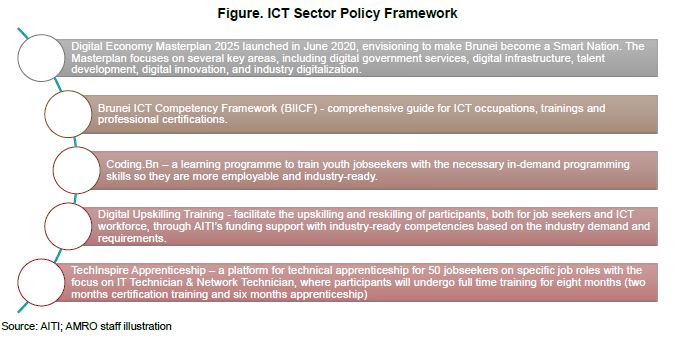This article was first published in The Scoop on June 24, 2024.
The world has witnessed an acceleration in the adoption of digital technology in the wake of the COVID-19 pandemic. Brunei is no exception. Stringent containment measures have spurred digital innovation to maintain connectivity and ensure the provision of essential services across the country.
The rapid shift toward digital solutions and innovation highlights the growing importance of the information and communication technology (ICT) sector in Brunei. In fact, ICT had been identified as a priority industry in the country’s economic diversification agenda even prior to the pandemic. Such early development of the industry had proven to be beneficial for Brunei when the first wave of the COVID-19 hit the Sultanate. In 2020, the ICT sector became a bright spot, growing robustly by 15.9 percent from just 0.1 percent in 2019.
Remarkable developments have been observed in the digital payments and e-commerce segments since the onset of the pandemic. Collaborations between domestic financial institutions and fintech companies have resulted in innovative payment solutions, including e-wallets such as BIBD QuickPay, Progresif Pay, DSTPay, and Beep Digital Solutions.
The Digital Payment Hub, a flagship project consisting of a National QR Code and an Instant Payment System, is another welcome initiative to further promote fintech development in Brunei, allowing users to make immediate and cost-effective fund transfers. A potential enhancement is the cross-border interoperability feature, which could be introduced in phases and allow Brunei to foster greater economic integration with regional and global markets.
Expanding e-commerce, advanced digital connectivity
In the e-commerce space, local authorities, such as the Darussalam Enterprise and the Authority for Info-communications Technology Industry (AITI), have collaborated to launch a domestic online directory of various e-commerce platform providers called eKadaiBrunei in April 2020. This is another encouraging innovation, not just responding to the need for business continuation during the pandemic, but also allowing local businesses to expand their market outreach.
Likewise, digital connectivity has also seen notable progress. The country’s 4G network coverage is estimated by Statista to have reached 100 percent in 2023, while the 5G network has already been put into use throughout the country since June 2023, marking the start of a new digital era to support Brunei’s journey to become a Smart Nation.
Despite the advances in digitalization in recent years, Brunei’s ICT sector remains in its infancy stage and has a lot of room to grow further. The sector accounted for a small share of GDP, approximately 2 percent in 2023. While the government aims to increase the sector’s contribution to GDP to 3.2 percent by 2025, there are several key challenges, such as the country’s strong reliance on government’s demand for the provision of ICT services, particularly government e-services. Other challenges include a small domestic market which raises concerns about sustainability of ICT adoption; the low level of digital literacy and/ or lack of awareness of digital adoption; difficulties in the integration of ICT into traditional sectors and small businesses; and labor market challenges such as attracting and retaining talents.
Realization of a Smart Nation
In the longer-term, the government aims to transform Brunei into a Smart Nation—one driven by digital government, digital economy, and digital society. Recognizing the vital importance of further capacity development in the ICT sector, the government has invested additional resources into bolstering the development of digitalization and the ICT sector through many supportive policies and frameworks.
The first five-year Digital Economy Masterplan 2025 has been launched to drive and strengthen Brunei’s digitalization momentum. At the same time, various frameworks, strategic plans, and skill training programs have also been developed, including ICT competency framework; coding program for young jobseekers; and digital upskilling program (Figure). The AITI Strategic Plan 2020 – 2025 has also been formulated to achieve a thriving digital industry, connected nation, and digitally enriched society.
In November 2022, the government established another program called the Digital for All to enhance digital capacity development and increase digital adoption in communities in order to strengthen the country’s labor productivity.
With the government’s steadfast commitment and a whole-of-nation approach, Brunei can successfully transform itself to becoming a Smart Nation through harnessing the promise of digitalization as the new growth engine.

